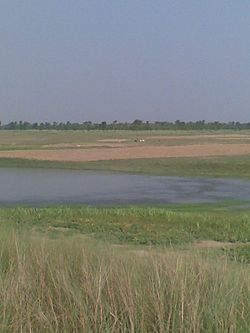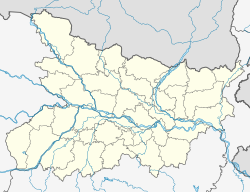
Rampur Jetha

This article needs additional citations for verification. (May 2011) |
Rampurwa
Rampurwa village | |
|---|---|
village | |
 | |
| Coordinates: 26°22′08″N 85°06′15″E / 26.36889°N 85.10417°E | |
| Country | |
| State | Bihar |
| Division | Tirhut |
| District | East Champaran |
| Block | Mehsi |
| Elevation | 51 m (167 ft) |
| Languages | |
| • Official | Bhojpuri, Hindi |
| Time zone | UTC+5:30 (IST) |
| PIN | 845426 |
| Telephone code | +91-6257 |
| ISO 3166 code | IN-BR |
| Nearest city | Mehsi |
| Lok Sabha constituency | Motihari |
| Vidhan Sabha constituency | Pipra, Purvi Champaran (Vidhan Sabha constituency) |
| Avg. summer temperature | 38 °C (100 °F) |
| Avg. winter temperature | 12 °C (54 °F) |
Rampurwa is a village situated in Mehsi, East Champaran District in the Indian state of Bihar. The village is commonly known as Rampurwa among the localities. It lies in the Mirjapur Panchayat region. It is situated at the bank of river Burhi Gandak River on whose bank the village has flourished. It is well connected by road and railways. The nearest city Kaswa Mehsi in Mehsi, which is 2 km from the village. The nearest railway station is Mehsi railway station, which is around 5 km from the village.

The village is located 2 km east of Mehsi police station. Mehsi is an entry point of East Champaran if travelling from Patna, Muzaffarpur to Raxaul, connected both by railway and roadway. This small community has a number of places of interest at the east side of railway station. These include Mirza Halim Shah mosque, dargah, a very old library 'Nagrik Pustakalaya', an old high school (Tirhut Vidyalaya) of the English period, orchards of lichi and mangoes and other places of interest. There are many button factories, a small scale industry, although most of the people depend upon agriculture and commerce. Mehsi was the birthplace of the writer and intellectual, Rajkamal Chaudhary. The last sentence about the birthplace of Rajkamal Chaudhary is not at Mehsi of District East Champaran, but it is at Saharsa district of Bihar.[1]

Location
The village is located 1 km east of Mehsi Police-station. The nearest highway is NH-28 which is 1.5 km west of village.[citation needed]

River
The village is situated on the bank of a Himalayan foothills Someshwer Range originated, perennial river Budhi Gandak on which bank the village has grown up and flourished.

Economy
The basic lively-hood is agriculture and cottage industry. Rampurwa is one of major producer of lichi in Mehsi. There are many button factories, a small scale industry, although most of the people depend upon agriculture and commerce.

Demographics
As of the 2001 India census the total population of the village is 375. The literacy rate is 65.61%. The female literacy rate is 47.1%. The male literacy rate is 78.71%.[2]

Climate
The summer, April–July is extremely hot and humid (28/40 deg C,90% Max.) and winter is cold, around 06/20 deg C. [2]

Gallery
-
Lichi Orchards Rampurwa Mehsi
-
Juicy Rampurwa Lichi
-
Shore Of Budhi Gandak in Rampurwa Mehsi
-
Embankment Gate Of Dam On River Budhi Gandak in Rampurwa, Mehsi
-
Lichi Orchards of Rampurwa Mehsi
-
Budhi Gandak river bank in Rampurwa Mehsi
-
Rampurwa Lichis
-
V.I.P Rd, Chowk Bazar in Mehsi
-
Mehsi Entry point
Notes
- The number of households in Rampurwa is 48. All the households are rural households.
- Female to male ratio of Rampurwa is 91.33% compared to the Bihar's female to male ratio 91.93%.
- The literacy rate of the village is 65.61% compared to the literacy rate of state 47%. The literacy rate of the village is better than state literacy rate.
- The female literacy rate is 47.1% compared to male literacy rate of 82.99%.
- The total working population is 69.47% of the total population. 91.84% of the men are working population . 45.65% of the women are working population.
- The main working population is 44.56% of the total population. 68.71% of the men are main working population . 18.84% of the women are main working population . While the marginal working population is 24.91% of the total population. 23.13% of the men are marginal working population. 26.81% of the women are marginal working population.
- The total non-working population is 30.53% of the total population. 8.16% of the men are non-working population . 54.35% of the women are non-working population.[2]
References
- ^ "Mehsi in India", India9.com, 30 June 2005, web: i9-Mehsi.
- ^ a b c . "all about bihar", www.allaboutbihar.com i8-Rampurwa Archived 2012-03-26 at the Wayback Machine.
External links
See what we do next...
OR
By submitting your email or phone number, you're giving mschf permission to send you email and/or recurring marketing texts. Data rates may apply. Text stop to cancel, help for help.
Success: You're subscribed now !











